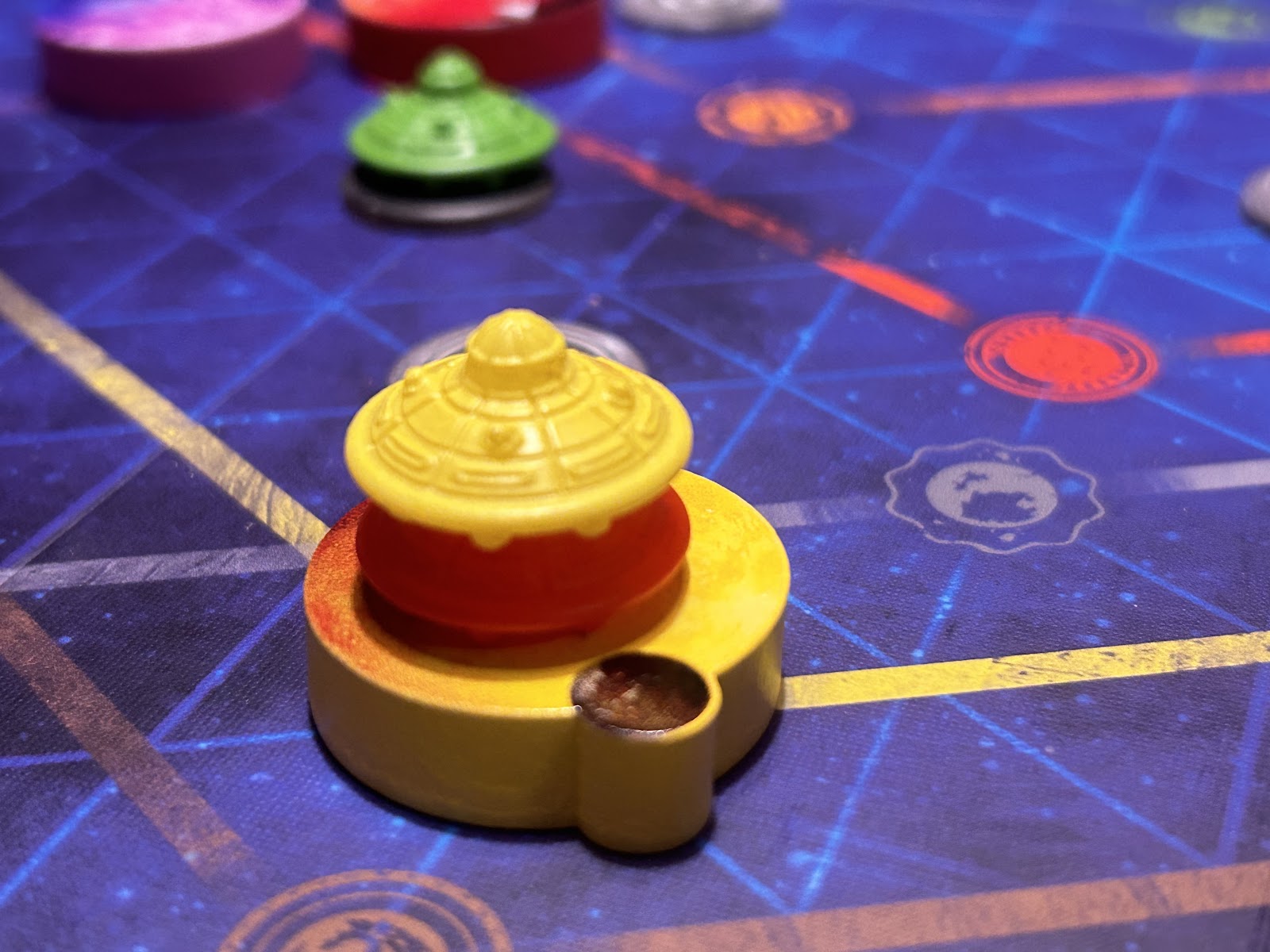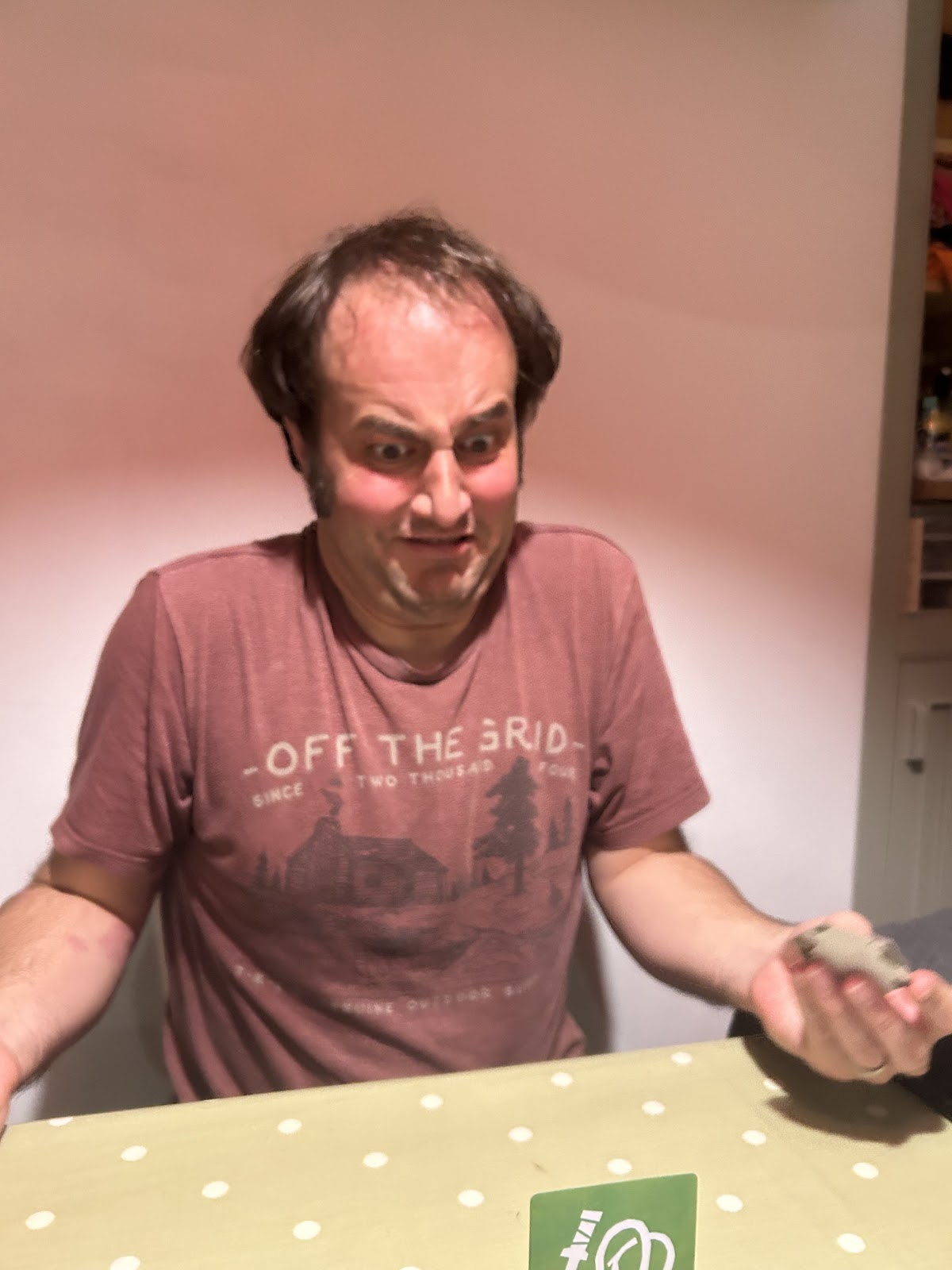Ian arrived with the score at 3-2 in his favour but I declined to award him victory, with plenty of time to recover had we kept playing. Instead we set up one of Martin's newbies, Up or Down. This is a game of building columns of cards that, like Lost Cities, may veer numerically up or down, but once you start in a direction you're committed to it. You can only ever have three columns, so if you're forced to take a card that won't fit into a set, you have to sacrifice a set of your choice and start over (although these discarded cards are worth a point each)
You have a hand of three cards and add to your set by playing into this central display, slotting your card into the place it would go in number order (above, for example, you could only play 66-68 between the 65 and 69) and then claiming one of the cards it's adjacent to. Then you replenish your hand with the top card from either deck: face-up or face-down. When the cards run out your columns score number of cards in them x most cards of a single colour.
Because the numbers keep changing and you're watching both that wheel of possibilities and the sacrifices you're making in your columns, it's quite a thinky undertaking, albeit also ripe with dickishness, particularly at the end-game where everyone must play the cards from their hand too. Ian came out top, despite announcing his impending doom:
Ian 103
Martin 91
Sam 62
Then we moved on to a game deserving of its own curtain flourish and red carpet: Knizia's new space racer, Orbit. This only just launched on Kickstarter yesterday (along with two others by the doctor) but Martin had been gifted a preview copy. It's a bit like Powerships with more control over your own movement, but less of the environs, as the other players keep moving things just as you're about to reach them.
The goal is to visit all the planets before returning to your own: first home is the winner. You have a hand of cards and on your turn you play one card and activate all the actions on it, in whatever order you choose. There's a number that moves your ship around the intersections of the grid, usually a planet to move along it's orbital path (the one card that doesn't move any planets changes the flips the direction of travel instead) and possibly extras like improving your hand size, improving your energy capacity (energy can be spent on additional movement) or replenishing up to your energy limit.
As you barrel around space visiting planets, you keep progress on your player board. Knizia has also thrown in space stations that are dotted around the galaxy: ending your movement here grants you a bonus: the aforementioned upgrades/energy, hyperjump portal (jump to another hyperjump space) or hyper accelerator cannon (move as far as you want in any straight line). Additionally, if you're on a planet when it moves, you move with it.
Everyone can see everyone else's progress and play cards accordingly to push planets away from them, something we all fell foul of. Martin got off to a thrilling start but his seemingly unassailable lead turned out to be assailable as first I, then Ian, caught him up while he dawdled in deep space. All of us gave ourselves one planet remaining to visit, but despite having precious few upgrades, luck favoured me as hopped onto the purple planet on the way home to my own. A galaxy of space arseholes, this is Knizia at his most dickish.
Sam wins
Martin and Ian - lose
We moved back to Earth for Landmarks - a third new set of rules for Ian, although probably the easiest of the night. Despite the theme of exploring an island for treasure before seeking the exit, this is a word association game that plays a bit like So Clover on a map. One player knows the landscape of the island, which is made up of treasure, traps, curses (lose the game) an amulet (heals a curse) and water (replenish tiles) and must guide the others to treasure and then safety by writing words on tiles and hoping they'll place them where the clue-giver/navigator intended.
Two curses or running out of tiles before finding the exit is a loss. In our first game I was the navigator and tried my best to guide Martin and Ian to first the treasure - success! - and then the exit - fail!
Navigator's secret map
But despite his chagrin, his stint as a navigator was a success - we only picked up two treasures but got off the island alive! And having escaped, we perused the shelves and Ian suggested Mille Fiori.
I got off to a good start here, completing early bonuses to establish something like a thirty point lead. But as we all know, 30 points in Mille Fiori is nothing, and though I held them off as long as I could, both Ian and Martin overtook me. For a while we were bunched close together in most un-Fiori-like fashion, but when we hit the final round Martin pulled off some kind of bonus-triggering spell and moved just out of reach. With his final turn he built on that lead, with Ian taking the collateral as the side-points I scored from his turn pushed me into second by a wafer-thin margin:
Martin 199
Sam 180
Ian 179
It was getting late but there's always time for So Clover. Our first attempt was a triumph, with a rock-solid 18/18 just as Martin had predicted - and this was despite neither Ian nor I being sure who Boadicea was. I felt she was heroic, and Ian rightly felt the Romans were involved somehow. We nearly went wrong in multiple ways before we went right:
Thrilled with our eighteen, we played again. Instantly everyone was complaining about their words and Martin decried our decision "Never play again after an eighteen!" he wailed. We kicked off with a four, got another four, and decided we'd go for all fours. We got them! A triumph of sorts.
That was it. Ian and Martin navigated their way past the sentient radiator and vanished into the night.













No comments:
Post a Comment